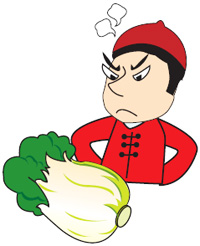Chinese upset in kimchi cabbage row
 Chinese cabbage has been the name for the main ingredient for the Korean side dish kimchi. But now Koreans are establishing sovereignty over what they eat by having an international naming organization almost decide to call it “kimchi cabbage.”
Chinese cabbage has been the name for the main ingredient for the Korean side dish kimchi. But now Koreans are establishing sovereignty over what they eat by having an international naming organization almost decide to call it “kimchi cabbage.”
Of course, there are grounds for the name change with the change in appearance, but Chinese netizens are upset at the adjective indicating the nationality of the vegetable being withdrawn and are showing their displeasure.
As it has been with other cases they have reacted on the basis of strong nationalism, perhaps reflecting their growing global power. In some cases, they are ahead of their government in their eagerness to flex their muscle.
Chinese internet users are showing discontent over the Codex Alimentarius Commission’s decision to adopt the name “kimchi cabbage” as an international standard.
The Codex was created by the Food and Agriculture Organization of the United Nations and World Health Organization in 1963 to develop food standards, guidelines and related texts.
Standards set by the commission serve as international guidelines for foods.
“This incident proves that our government is a big loser,” wrote a Chinese user named Bernieyin in Weibo, a popular Twitter-like microblogging site, Friday. “If we don’t take care of precious things that our ancestors left for us, it means that we are not learning anything from the incident of the Dano holiday.”
The Chinese claim Korea stole Dano, a celebration promoting abundant crops after harvest, as it originated from ancient times in China. It is now a major holiday in Korea.
“Koreans claim they are the founders of kimchi. They try to call cabbage originally from China’s Northeastern region kimchi cabbage,” said a user named MoguHouMianbao.
“Our government should make some kind of move,” said a user named ZiseOuran520.
The cabbage was categorized as “Chinese cabbage” until the 44th session of the meeting of the Codex Committee on Pesticide Residues held in Shanghai last month.
According to Korea Food and Drug Administration (KFDA), the Codex adopted the proposal made by Korean participants to classify specific kinds of Chinese cabbage as Kimchi cabbage since the organization recognized the difference in the shape.
“It is true that the cabbage comes from China. But the shape of Chinese cabbages that are cultivated in Korea has changed,” said Im Moo-hyeong, a researcher at the KDFA who participated in the latest meeting of the codex committee. “The members of the committee admitted that the shape of kimchi cabbage is different as its leaves tend to grow to the center while that of the Chinese cabbage grow outward.”
Im said he refrained from requesting the cabbage be named “Korean cabbage” due to a possible backlash from Chinese members.
The researcher also added that Chinese participants were relatively friendly concerning the name change during a workshop held prior to the meeting.
The name “kimchi cabbage” is waiting to get final approval by the commission’s general assembly next July.
Kimchi, made by soaking cabbages in brine and applying marinade in between the leaves, is the most well-known Korean dish. Many Koreans eat kimchi on a daily basis; and it is well-recognized among foreigners as Korean food. <Korea Times/Chung Min-uck>



















































